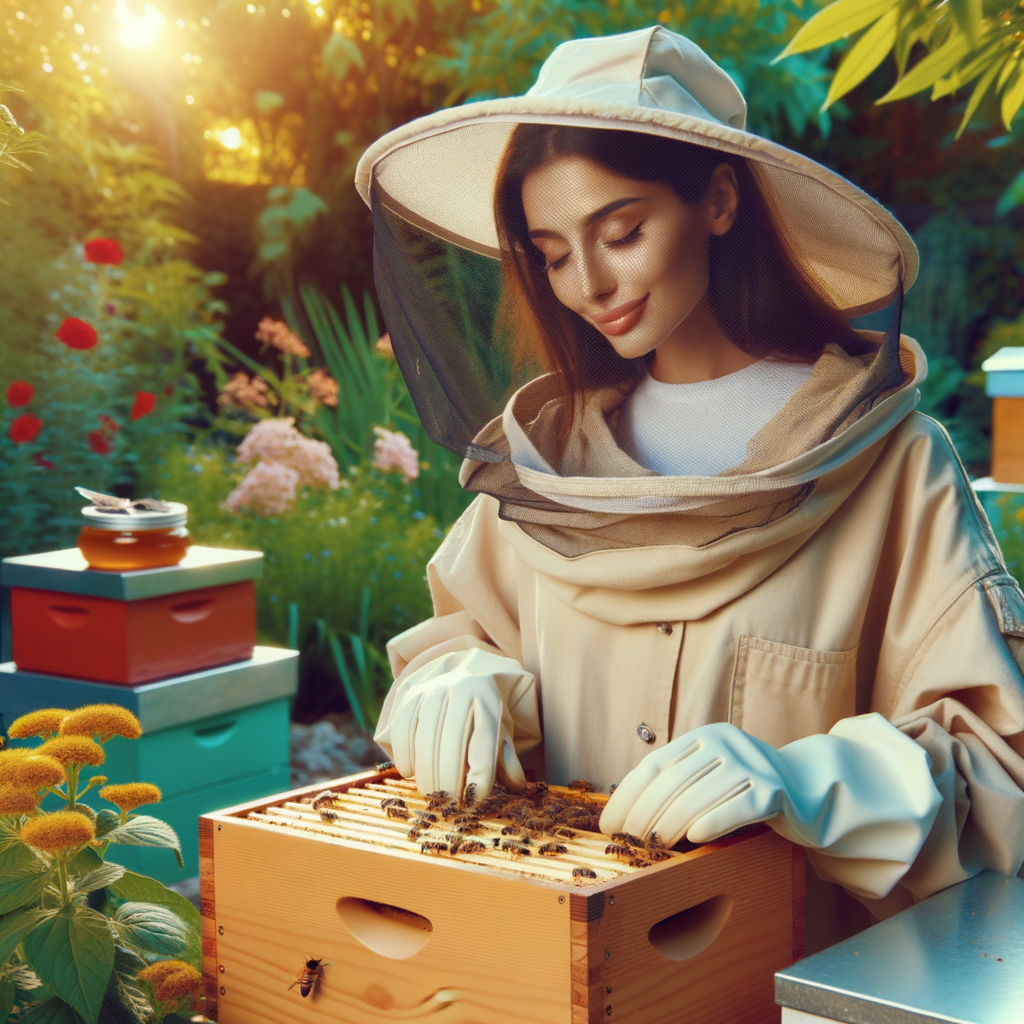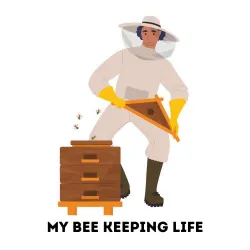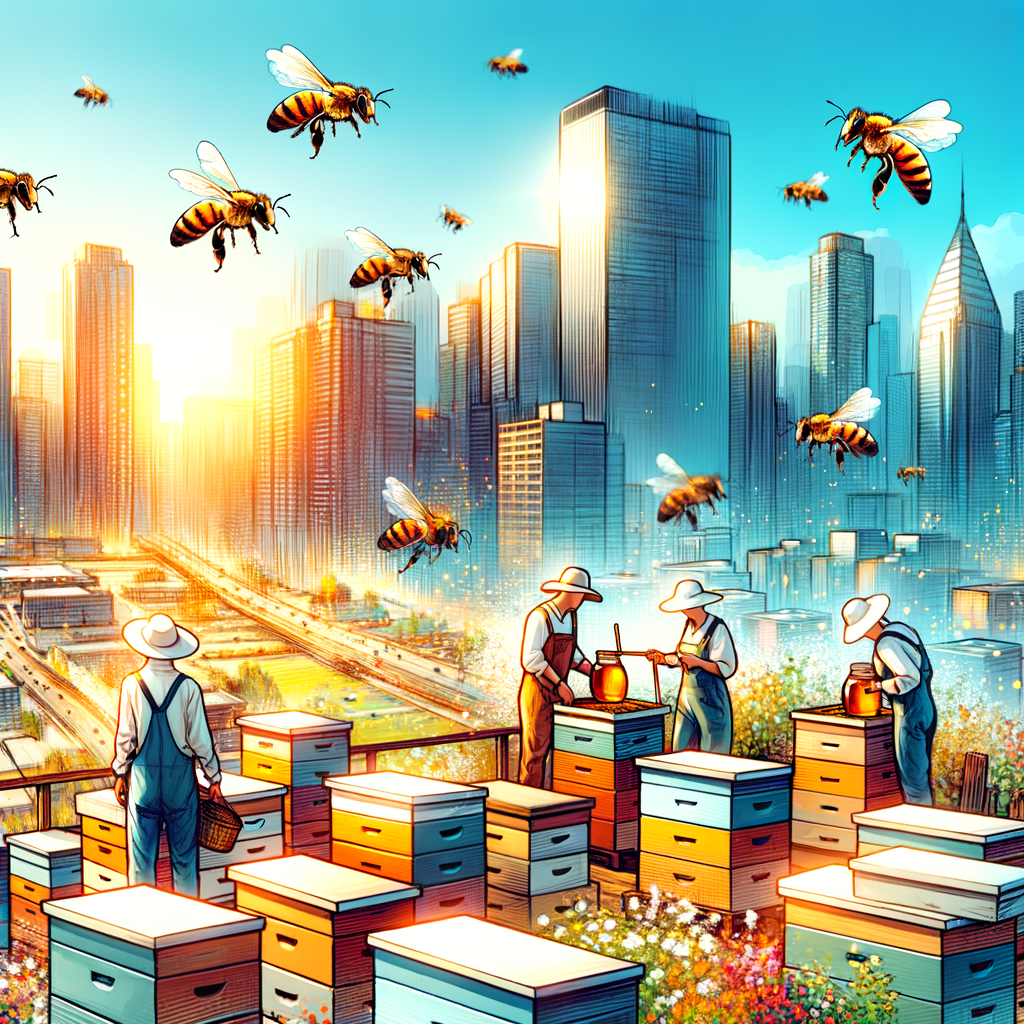
Introduction to Beekeeping and its Therapeutic Benefits
Welcome to the fascinating world of beekeeping! This age-old practice not only provides us with delicious honey but also offers numerous therapeutic benefits. In this section, we will delve into the basics of beekeeping and introduce you to the concept of beekeeping therapy.
- Overview of Beekeeping
- Introduction to the Concept of Beekeeping Therapy
Beekeeping, also known as apiculture, is the maintenance of bee colonies, usually in hives, by humans. This practice dates back thousands of years and is carried out for various reasons, including honey production, pollination of nearby crops, and production of beeswax, propolis, and royal jelly. Beekeepers also raise queens and bees to sell to other farmers.
Bees are essential to our ecosystem as they play a vital role in pollinating the plants that make up the world’s food supply. Without bees, many of our favorite fruits and vegetables would become extremely rare and expensive.
Beekeeping therapy, also known as apitherapy, is a form of therapy that involves the use of bee products, including honey, pollen, propolis, royal jelly, and bee venom. This therapy has been used for centuries to treat various health conditions, including arthritis, wounds, and burns. However, in recent years, the therapeutic benefits of beekeeping have expanded beyond physical health.
Research has shown that beekeeping can have significant mental health benefits. The act of caring for bees, observing their behavior, and being in nature can have a calming effect, reducing stress and anxiety. It can also boost self-confidence and provide a sense of purpose, improving overall mental well-being.
In the following sections, we will explore the connection between beekeeping and mental health, look at case studies demonstrating the mental health improvements through beekeeping, and provide a practical guide to starting with beekeeping for mental health. So, let’s embark on this exciting journey together!
The Connection between Beekeeping and Mental Health
Did you know that beekeeping can have a positive impact on your mental health? Let’s delve into the fascinating connection between these two seemingly unrelated topics.
Mental Health and Beekeeping: An Overview
Understanding the link between mental health and beekeeping, as well as how beekeeping can contribute to mental well-being, can provide a fresh perspective on therapeutic practices. Let’s explore this in more detail.
- Understanding the link between mental health and beekeeping
- How beekeeping can contribute to mental well-being
Beekeeping is not just about producing honey. It’s a practice that requires patience, focus, and a deep connection with nature. These elements can have a profound impact on our mental health. In fact, the act of observing and caring for bees can help us stay present, reduce stress, and foster a sense of purpose.
Beekeeping can serve as a form of therapy. The routine of caring for the hive, the calming hum of the bees, and the satisfaction of harvesting honey can all contribute to a sense of accomplishment and peace. This can help improve mood, reduce feelings of anxiety, and enhance overall mental well-being.
In conclusion, beekeeping is more than a hobby or a profession. It’s a therapeutic practice that can help us maintain our mental health. So, why not give it a try? You might find it to be a sweet solution to stress and anxiety.
Psychological Benefits of Beekeeping
There are numerous psychological benefits associated with beekeeping. Let’s delve into some of these benefits and understand how they contribute to mental well-being.
- Stress relief through beekeeping
- Beekeeping as a mindfulness practice
- Boosting self-esteem and confidence through beekeeping
Engaging in beekeeping activities can be a great stress reliever. The rhythmic, repetitive tasks involved in beekeeping, such as inspecting hives and harvesting honey, can help to calm the mind and reduce stress levels. In fact, a study conducted by the University of Sussex found that listening to the buzzing of bees can significantly lower stress levels. The study participants reported feeling more relaxed and less anxious after spending time in the apiary.
Beekeeping can also serve as a form of mindfulness practice. Mindfulness is the act of focusing one’s attention on the present moment, and beekeeping requires a high level of focus and attention to detail. As you work with the bees, you become fully immersed in the task at hand, helping to quiet the mind and promote a state of mindfulness. This can lead to improved mental clarity and a greater sense of peace and tranquility.
Beekeeping can also boost self-esteem and confidence. Successfully managing a hive and producing your own honey can provide a sense of accomplishment and pride. This can lead to increased self-esteem and confidence, which can have a positive impact on overall mental health. In a survey conducted by the British Beekeepers Association, 80% of beekeepers reported feeling more confident as a result of their beekeeping activities.
In conclusion, beekeeping is not only a fascinating hobby but also a powerful tool for improving mental health. So, if you’re looking for a new hobby that can help reduce stress, promote mindfulness, and boost your self-esteem, beekeeping might just be the perfect fit for you.
Case Studies: Mental Health Improvement through Beekeeping
Let’s dive into some real-life examples that show how beekeeping can help improve mental health.
-
Case Study 1: Beekeeping as a mental health tool
Meet John, a 45-year-old man who was battling severe depression. He felt isolated and struggled with daily tasks. One day, he stumbled upon a local beekeeping club and decided to give it a try.
John found that beekeeping required focus and patience. He had to pay attention to the bees’ behavior and learn about their needs. This helped him shift his focus from his worries to the task at hand. Over time, he noticed a significant improvement in his mood and overall mental health.
John’s story is a testament to the therapeutic benefits of beekeeping. It shows how this activity can serve as a mental health tool, providing a sense of purpose and a distraction from negative thoughts.
-
Case Study 2: Honey bees and mental health
Next, let’s look at Sarah, a 30-year-old woman suffering from anxiety. She was always on edge, and her anxiety often led to sleepless nights. Sarah’s therapist suggested she try beekeeping as a form of therapy.
As Sarah started to learn about honey bees, she found a sense of calm she hadn’t experienced before. The buzzing of the bees had a soothing effect, and the process of collecting honey was rewarding. She felt a connection with nature that helped her relax and manage her anxiety.
Sarah’s experience highlights the role honey bees can play in improving mental health. The simple act of observing and interacting with these creatures can have a profound impact on one’s emotional well-being.
These case studies illustrate the potential of beekeeping as a therapeutic activity. Whether it’s providing a sense of purpose, a distraction from worries, or a connection with nature, beekeeping can offer numerous mental health benefits.
Practical Guide: Starting with Beekeeping for Mental Health
Embarking on a beekeeping journey can be a rewarding experience, especially when it comes to improving mental health. Here’s a simple guide to help you get started with beekeeping.
Getting Started with Beekeeping
Starting with beekeeping involves understanding the basics, investing in the right equipment, and learning about bee behavior and hive management. Let’s delve into each of these steps:
- Understanding the basics of beekeeping
- Investing in beekeeping equipment
- Learning about bee behavior and hive management
Beekeeping, also known as apiculture, is the practice of maintaining bee colonies in hives. Bees are essential for pollination, which helps plants to reproduce. As a beekeeper, your role will be to ensure the health and productivity of your bee colonies. This includes providing them with a safe and clean environment, monitoring their health, and harvesting honey.
Before you start, you’ll need to invest in some basic beekeeping equipment. This includes a bee suit for protection, a smoker to calm the bees, a hive tool to inspect the hive, and of course, the bee hives themselves. It’s important to invest in quality equipment to ensure your safety and the health of your bees.
Understanding bee behavior is crucial to successful beekeeping. Bees communicate through a series of dances and pheromones, and understanding these can help you better manage your hives. Hive management involves regular inspections to check for diseases and pests, as well as to ensure the queen is healthy and laying eggs. It also includes managing the honey production and harvesting it without harming the bees.
Starting with beekeeping can be a fulfilling hobby that not only benefits the environment but also contributes to your mental well-being. The process of caring for the bees and watching them thrive can be a therapeutic experience, helping to reduce stress and promote a sense of accomplishment.
Beekeeping Safety Measures
When embarking on the rewarding journey of beekeeping, it is crucial to prioritize safety. Understanding the risks and implementing appropriate safety measures can ensure a positive and therapeutic experience. Let’s delve into the key safety measures that every beekeeper should know.
- Understanding the Risks and Safety Measures in Beekeeping
- Using Protective Clothing and Equipment
- Handling Bees Safely
Before you start beekeeping, it’s important to understand the potential risks. Bees are generally non-aggressive, but they may sting if they feel threatened. This can lead to allergic reactions in some people. Therefore, it’s essential to learn about bee behavior and how to handle bees safely. Additionally, proper maintenance of the hive is necessary to prevent diseases that can harm the bees and reduce honey production.
Wearing the right protective clothing is a crucial safety measure in beekeeping. A beekeeper’s suit, gloves, and a veil can protect you from bee stings. The suit is usually made of light-colored and smooth material to prevent attracting bees. Gloves protect your hands, while the veil keeps bees away from your face and neck. Using a smoker can also help calm the bees and make handling them safer.
Safe handling of bees is a critical aspect of beekeeping. It’s important to move slowly and calmly around the hive to avoid alarming the bees. When inspecting the hive, do so during warm, sunny, and windless days when bees are likely out foraging. Always use a smoker to calm the bees before opening the hive. Remember, a calm beekeeper makes for calm bees.
In conclusion, beekeeping can be a safe and therapeutic activity when the right safety measures are in place. Understanding the risks, using protective clothing and equipment, and handling bees safely are key to a successful and enjoyable beekeeping experience.
Conclusion: Embracing Beekeeping for Mental Well-being
As we reach the end of our exploration into the world of beekeeping and its therapeutic benefits, it’s important to remember the key points we’ve discussed. Beekeeping is not just an interesting hobby or a way to help the environment, but it can also be a powerful tool for improving mental health.
- Recap of the mental health benefits of beekeeping:
- Encouragement for individuals to explore beekeeping as a therapeutic activity:
Beekeeping provides a unique combination of physical activity, connection with nature, and the satisfaction of caring for living creatures. It encourages mindfulness, focus, and patience, which are all beneficial for mental health. Studies have shown that beekeepers often report lower stress levels, improved mood, and a greater sense of well-being.
If you’re looking for a new way to boost your mental health, why not consider beekeeping? It’s a rewarding activity that can help you feel more connected to the world around you. Plus, you’ll be doing your part to support our vital bee populations. Remember, you don’t need to have a huge garden or live in the countryside to keep bees. With the right guidance and equipment, you can start your beekeeping journey wherever you are.
In conclusion, embracing beekeeping can be a step towards better mental well-being. It’s a journey of discovery, learning, and personal growth. So why not give it a try? You might find that it’s the buzz you’ve been looking for!








